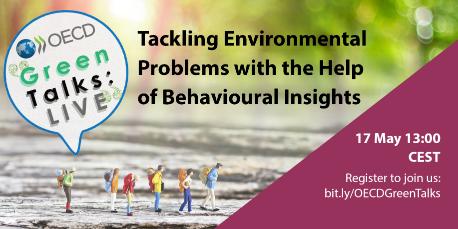Energy

Tackling Environmental Problems with the Help of Behavioural Insights
Behavioural insights can help policy makers obtain a deeper understanding of the behavioural
mechanisms contributing to environmental problems, and design and implement more effective
policy interventions. This report reviews recent developments in the application of
behavioural insights to encourage more sustainable consumption, investment and compliance
decisions by individuals and firms.
Drawing on interventions initiated by ministries and agencies responsible for environment
and energy, as well as cross-government behavioural insights teams, it portrays how
behavioural sciences have been integrated into the policy-making process. The report
covers a variety of policy areas: energy, water and food consumption, transport and
car choice, waste management and resource efficiency, compliance with environmental
regulation and participation in voluntary schemes. It shows what has proven to work
– and what has not – in policy practice in OECD countries and beyond.
Published on May 10, 2017Also available in: French
TABLE OF CONTENTS
| Foreword and Acknowledgements | |
| Executive summary | |
| How can behavioural insights help tackle environmental problems? | |
| Mapping out applications of behavioural insights to environmentally relevant policy | |
| Using behavioural insights to increase energy conservation and energy efficiency | |
| Using behavioural insights to promote more sustainable transport choices | |
| Using behavioural insights to encourage water conservation | |
| Using behavioural insights to incentivise environmentally sustainable food consumption | |
| Using behavioural insights to improve waste management and resource efficiency | |
| Using behavioural insights to increase compliance with environmental regulation and participation in voluntary schemes |
Powered by OECD iLibrary
